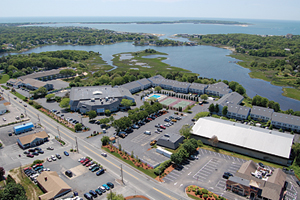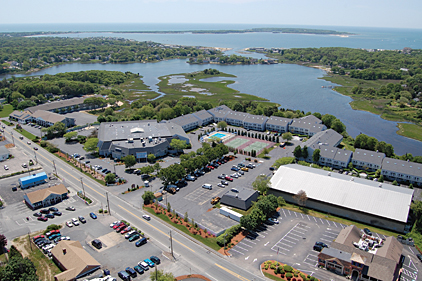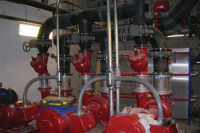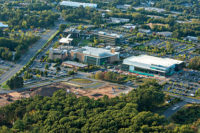
|
| The Cove at Yarmouth Resort is receiving $31,000 in direct rebates on its $600,000 investment in hybrid water heaters and ultra-high efficiency boilers. Photo courtesy of The Cove at Yarmouth Resort |
Since 1986 the Cove at Yarmouth Resort has been a prime vacation spot for visitors to the Cape Cod, Mass., area.
The West Yarmouth facility features 229 one-bedroom timeshare condominiums and for the majority of the year logs occupancies between 65% and 70%. In June, July, August and September, occupancy levels spike above 95%.
With such a high volume of use, General Manager Michael Edwards was looking for ways to not only modernize the systems in the facility, but to lower energy and water consumption totals.
He did that by initiating a number of retrofits that have produced significant savings. The biggest change was the installation of 19 Eternal hybrid water heaters. The complex previously used 23 100-gal., high-recovery hot water tanks (199,000 Btu each).
“They were not overly efficient,” Edwards says.
Edwards notes the new 98% efficient, 195,000 Btu hybrid models have resulted in an average natural gas savings of 17% a month over a 12- to 13-month period since installation.
“Overall efficiency wins the day,” he says.
Edwards explains a crane used to be needed to switch out the old water heaters due to their locations, which was a considerable additional expense per replacement. “The hybrid models are about the size of a family suitcase and are easy to work on. It’s a matter of disconnecting the unit, the air, gas and water lines and putting in a new one,” he says.
Also on the retrofit list were the facility’s 27-year-old boilers that were original to the property. Those 250,000 Btu boilers were replaced with nine Weil-McLain ultra-high efficiency models (230,000 Btu, 95% EE rating).
“With the old ones all three were packaged together and were running all the time,” Edwards says. “The new models are variable-speed, modulating-condensing and are in a series together. They fire only when needed.”
Other green upgrades include the installation of low-flow toilets (1.28-gpf from American Standard), showerheads (Oxygenics and American Standard), shower valves (Moen) and aerators. Edwards has noticed a downturn in the facility’s water usage since going to greener fixtures.
Edwards realized additional efficiencies by installing two constant air regulators behind the grilles in each bathroom. Direct-drive, variable-speed exhaust fans with dampers replaced the existing 21 single-speed exhaust fans. The new setup reduces the air flow being drawn from the rooms from 95 cfm to 50 cfm and thus lowers energy usage. Edwards also installed 165 LED lights throughout the facility.
The retrofit projects were aided by a rebate program from Mass Save, an energy auditing organization that provides home energy audits and energy efficiency rebates for homes and businesses in Massachusetts.
“Cape Light Compact (a contractor for Mass Save in the Cape Cod area) is the local utility rebate company you go through and we worked a relationship with them through Rise Engineering and got a lot of the project subsidized,” Edwards says. “We made a capital investment of somewhere around $600,000 for the equipment we installed (water heaters and boilers) and we received more than $31,000 in direct rebates from Cape Light Compact and Mass Save.”
Edwards, who is investigating the potential future use of solar technology on the property, is glad he went through with the sustainable upgrades.
“Before, we were wasting utilities,” he says. “The mechanicals’ useful life had come due. It was time to do something about it. We’re very happy with the results.”



